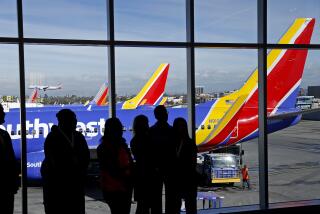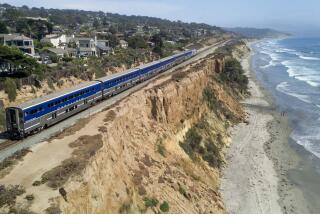Subsidies Ensure Service to the Traveling Public
- Share via
“A Diet for Ailing Airlines” (editorial, Nov. 4) and “Uncertainty Shadows Starlight” (Nov. 3) both ignore the fact that subsidies have been a major part of transportation in the U.S. for most of our history. They are nothing new and are necessary in many cases to ensure needed service to the public.
A leading airline publication recently characterized its industry as one of the worst investments in the history of U.S. transportation. The picture would be even more dismal if the carriers had to pay (like railroads) the real infrastructure costs of their operating environment (airports, air traffic control systems, etc.). Indeed, the airlines’ current financial crunch is worsened by security costs, something they now want the government to pay for.
As for Amtrak’s Coast Starlight -- explain why it is booked to capacity much of the year, the huge numbers of people who ride it and the fact that it serves many communities that are not privileged to low end-to-end airfares. The Starlight, by the way, does not serve Monterey.
John A. Kirchner
Professor, Geography
and Transportation
Cal State L.A.
*
Your editorial mentioned that airlines should shed excess cost before being granted a government bailout. You suggested that using bankruptcy to knock well-paid pilots into a lower tax bracket might make some envious souls feel better.
I wonder how those “envious souls” would feel if they knew United Airlines’ new CEO, Glenn Tilton, is receiving a $3-million bonus. In these days of a bad economy and millions of layoffs, it seems excessive for any company, and especially one that is facing bankruptcy, to be awarding its CEO a $3-million bonus.
Al Pennington
United Airlines Pilot (Ret.)
Banning
More to Read
Sign up for The Wild
We’ll help you find the best places to hike, bike and run, as well as the perfect silent spots for meditation and yoga.
You may occasionally receive promotional content from the Los Angeles Times.






